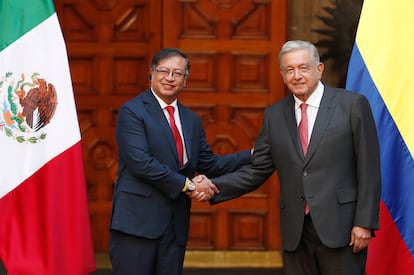Colombia’s Petro recruits Mexico’s López Obrador, in his quest to rethink the war on drugs
The president of Mexico will fly to visit the Colombian president. They will jointly hear the conclusions stemming from a Latin American summit on narcotics that begins on September 7


Andrés Manuel López Obrador (AMLO) has heeded the call of Gustavo Petro. The president of Mexico – who rarely leaves his country – will visit Colombia this Friday and Saturday. He will accompany Colombian President Petro as they receive the conclusions of the Latin American conference on narcotics, which begins on Thursday, September 7. The Colombian government convened this meeting in Cali, with the purpose of pushing for a shift in the global effort to combat drug-trafficking.
The presidents of the two countries most affected by the violence of the cartels are eager to recruit the rest of Latin America to change the direction of the failed war on drugs. This is one of the main foreign policy goals that Petro has committed to. When the Colombian head of state visited Mexico City this past November – amidst a series of left-wing victories across the region – both presidents smiled for the cameras in the National Palace, underneath murals by Diego Rivera. Following that meeting, their foreign ministries confirmed the convening of a conference to “redesign and rethink drug policy” – something that Colombia and Mexico will play a central role in. This proposal will begin to take shape in Cali this Thursday.
The first left-wing president in modern Colombian history has called for a refocusing of anti-narcotics efforts. In the long year that he has been in power, Petro has insistently asked legislators and the judiciary to stop criminalizing the weakest links in the chain – the coca growers – and to concentrate efforts on hitting the big criminal organizations that profit from drug-trafficking. The Cali conference is a first step in his quest to achieve this. The expected result is a road map that will lead to a new analysis of global drug policy, as well as the formation of a working group that will eventually lead a global summit of leaders. This is according to Elizabeth Taylor Jay, Colombia’s vice-minister of multilateral affairs.
Colombia is, by far, the world’s leading producer of coca leaves – the raw material necessary for the production of cocaine. It has reached the largest extent of drug cultivation since records have been kept. The total amount of land used for coca production soared from 353,000 acres to 504,000 acres by the end of 2021, according to the annual report published by the United Nations Integrated System for Monitoring Illicit Crops (SIMCI), which is about to publish the 2022 results. This rising trend (which precedes Petro’s administration) has led the United States – the world’s largest consumer of cocaine – to loudly voice its concern.
The record numbers in Colombia reveal the failure of Petro’s predecessor – the conservative Iván Duque (2018-2022) – who placed an emphasis on eradication, following the more moderate policies of Juan Manuel Santos’ administration (2010-2018). While Santos advocated for shifting the global fight against drug-trafficking and addressing it as a matter of human rights and public health – as Petro does now – Duque returned to prohibitionism and favored forced eradication, to the detriment of the voluntary substitution agreements that had previously been made with farmers. Petro considers this hard-line way of approaching the problem to be a big mistake. At a speech he gave before the UN General Assembly in 2022, he asked that the world “put an end to the irrational war against drugs.”
That call has since received many endorsements. The fight against drug-trafficking requires profound changes – such as those requested by Petro – since the prohibition policy has failed, according to the Global Commission on Drug Policy. Former Colombian presidents
César Gaviria (1990-1994) and Santos ( 2010-2018) – as well as former Mexican President Ernesto Zedillo (1994-2000) – are members of this commission. Petro has also obtained the support of the Puebla Group, which brings together certain leftist leaders from around Latin America.
AMLO – as he is known – has backed Petro on several occasions, including since the 2022 presidential campaign that brought him to power. At the moment, the Colombian president is going through a difficult moment, with his reforms stuck in Congress, his son being investigated by the courts and various scandals surrounding members of his inner circle.
“I have the best opinion of him, he’s a man of principles,” the Mexican president said last month, when asked about his counterpart. Mexico is one of the guarantor countries of the peace negotiations between Petro’s administration and the National Liberation Army (ELN), the last major armed guerrilla group in Colombia. Mexico has already hosted a series of dialogues and is preparing to receive the delegations again this month.
Mexico is very important to Petro, explains Mauricio Jaramillo Jassir, a professor of international relations at the Universidad del Rosario in Bogotá. When conservative parties were in power across the region, the first government that began a new left-wing cycle was AMLO’s, he recalls, in 2018. “Many – including Petro – see him as a pioneer [in making] the pendulum swing to the left. [The Mexican president] also echoes Petro’s foreign policy claims, especially in the realm of drugs, regional integration, peace [processes] and [advocacy for] Venezuela to return to the international scene. Mexico supports the multilateral demands being made by Colombia.”
The Colombian government had already mobilized its diplomatic core to convene an international conference on the Venezuelan crisis in Bogotá, as well as another one on the Amazon in Leticia – the southernmost city in Colombia – which will be attended by Brazilian President Luiz Inácio Lula da Silva, the heavyweight of the Latin American progressive axis. With the conference on drugs, Petro appears to be repeating a move that seeks to raise the profile of his foreign policy.
“Petro identifies the most visible, outstanding and powerful actors on each of these issues… he tries to get these leaders to join him,” Jaramillo Jassir observes. “Colombia is demanding a place at the table to make decisions, by virtue of the fact that it’s associating with other countries,” adds analyst Sergio Guzmán, director of Colombia Risk Analysis. However, he warns that this impulse must be accompanied by “concrete actions, so that it’s all not just about rhetoric.”
Sign up for our weekly newsletter to get more English-language news coverage from EL PAÍS USA Edition
Tu suscripción se está usando en otro dispositivo
¿Quieres añadir otro usuario a tu suscripción?
Si continúas leyendo en este dispositivo, no se podrá leer en el otro.
FlechaTu suscripción se está usando en otro dispositivo y solo puedes acceder a EL PAÍS desde un dispositivo a la vez.
Si quieres compartir tu cuenta, cambia tu suscripción a la modalidad Premium, así podrás añadir otro usuario. Cada uno accederá con su propia cuenta de email, lo que os permitirá personalizar vuestra experiencia en EL PAÍS.
¿Tienes una suscripción de empresa? Accede aquí para contratar más cuentas.
En el caso de no saber quién está usando tu cuenta, te recomendamos cambiar tu contraseña aquí.
Si decides continuar compartiendo tu cuenta, este mensaje se mostrará en tu dispositivo y en el de la otra persona que está usando tu cuenta de forma indefinida, afectando a tu experiencia de lectura. Puedes consultar aquí los términos y condiciones de la suscripción digital.








































